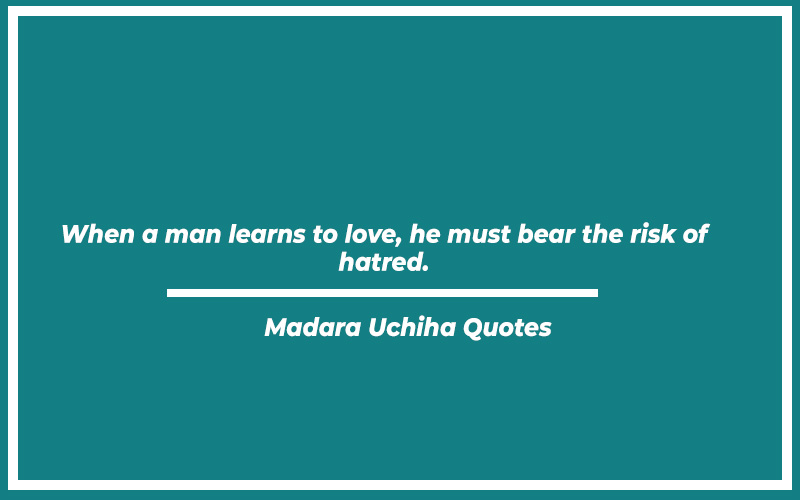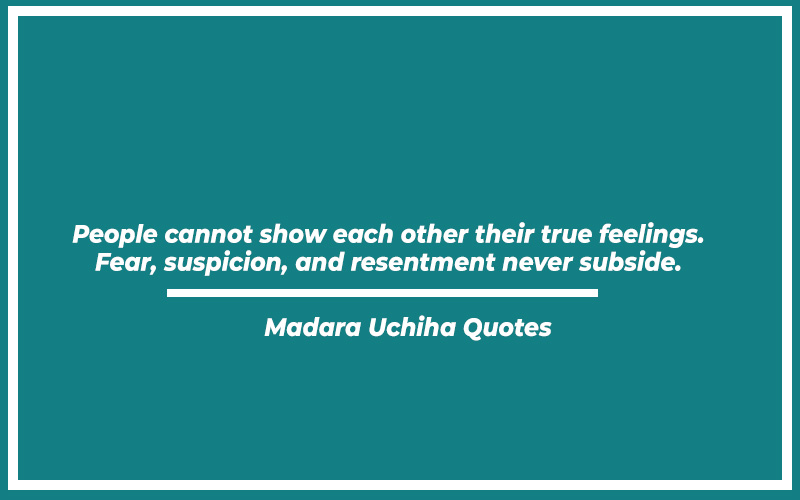Madara Uchiha, a central character in the acclaimed manga and anime series “Naruto” created by Masashi Kishimoto, is known for his profound and often thought-provoking quotes. As a legendary leader with a complex personality, Madara’s words often reflect his deep insights into power, conflict, reality, and the human condition.
His quotes are not just a reflection of his character in the narrative, but they also offer a broader commentary on life, war, peace, and the inherent contradictions in human nature.
Through his dialogues, Madara challenges conventional beliefs and invites the audience to ponder the deeper philosophical questions that underlie the series’ action-packed storyline.
Madara Uchicha Quotes

“When a man learns to love, he must bear the risk of hatred.” – Madara Uchiha
Madara Uchiha’s quote underscores the inherent risk in experiencing love – the possibility of encountering its antithesis, hatred. This profound statement reflects on the vulnerability and courage required to open one’s heart to others.
It suggests that to love is to expose oneself to potential pain and betrayal, a notion resonating with the complexity of human relationships. The quote challenges us to consider the balance of emotions in our lives, recognizing that the depth of love can be matched by the intensity of hatred.
“The concept of hope is nothing more than giving up. A word that holds no true meaning.” – Madara Uchiha
Here, Madara Uchiha presents a cynical view of hope, portraying it as a form of surrender rather than a source of strength. He suggests that relying on hope is akin to abandoning action and yielding to fate.
This interpretation challenges the traditionally positive perception of hope, framing it as a passive and meaningless concept. The quote prompts a reflection on the nature of hope and its role in human resilience, questioning whether true strength lies in action and determination rather than hopeful anticipation.
“Wake up to reality! Nothing ever goes as planned in this world. The longer you live, the more you realize that in this reality only pain, suffering and futility exist.” – Madara Uchiha
Madara’s words paint a grim picture of reality, marked by pain, suffering, and the futility of human endeavors. This quote suggests a nihilistic worldview, emphasizing the harshness and unpredictability of life.
It challenges the listener to confront the often unpleasant truth of our existence, arguing that disillusionment is an inevitable part of maturing. Madara’s perspective invites contemplation on the nature of human experience, questioning the validity of our plans and dreams in the face of life’s inherent unpredictability.
“Power is not will, it is the phenomenon of physically making things happen.” – Madara Uchiha
Madara Uchiha defines power in tangible terms, as the ability to manifest change in the physical world. This perspective prioritizes action and force over intention or moral strength.
The quote challenges conventional notions of power, suggesting that true influence lies in concrete actions rather than in the will or desires behind them. It invites reflection on the nature of power and its true sources, questioning whether the essence of power is in its execution rather than its conception.
“In this world, wherever there is light – there are also shadows. As long as the concept of winners exists, there must also be losers. The selfish desire of wanting to maintain peace causes wars, and hatred is born to protect love.” – Madara Uchiha
Madara Uchiha’s quote delves into the inescapable duality of existence. He highlights how light and darkness, victory and defeat, peace and war are intrinsically linked. The quote suggests that even noble intentions can lead to destructive outcomes, as in the pursuit of peace leading to war.
This perspective offers a nuanced understanding of human nature and societal dynamics, emphasizing the paradoxes and unintended consequences that arise from our actions and desires.
“Man seeks peace, yet at the same time yearning for war… Those are the two realms belonging solely to man. Thinking of peace whilst spilling blood is something that only humans could do. They’re two sides of the same coin… to protect something… another must be sacrificed.” – Madara Uchiha
This quote reflects on the contradictory nature of human aspirations and actions. Madara Uchiha points out the irony in humanity’s quest for peace, which often coexists with a fascination for war.
He underscores the unique human tendency to harbor conflicting desires and to justify violence in the name of higher goals. The quote prompts a contemplation on the moral complexities of human behavior, especially in the context of sacrifice and protection.
“People cannot show each other their true feelings. Fear, suspicion, and resentment never subside.” – Madara Uchiha
Madara Uchiha expresses a deeply cynical view of human interaction, suggesting that true emotions are often concealed behind a veil of fear, suspicion, and resentment.
This quote paints a bleak picture of human relationships, where genuine understanding and openness are hindered by negative emotions. It invites introspection on the nature of communication and trust, questioning whether it is ever truly possible to transcend these barriers and connect authentically with others.
“You know you’re alive if you feel pain.”– Madara Uchiha
This quote by Madara Uchiha offers a unique perspective on the role of pain in affirming life. Unlike traditional views that see pain negatively, Madara suggests that feeling pain, be it physical or emotional, is a clear indicator of being alive.
This perspective aligns with existential philosophies that link sensory experiences to the affirmation of existence. In a world where detachment or numbness can be prevalent, pain serves as a vital, though uncomfortable, reminder of our humanity, our vulnerabilities, and our ongoing struggle within the reality of life.
“When a man dies with pride, he only thinks of the good things he has done, but he forgets the problems he has left behind.”– Madara Uchiha
Madara Uchiha’s quote here delves into the human tendency to retrospectively glorify one’s life, focusing on achievements and ignoring unresolved issues. It’s a poignant reminder of the selective nature of human memory, especially at life’s end. The quote underscores the importance of self-awareness and responsibility.
It suggests that a true evaluation of one’s life should include not just the positives but also the negatives, and the impact one leaves on others. This introspective view encourages a balanced and honest assessment of one’s actions and their long-term effects.
“If there’s no darkness, you just create it.”– Madara Uchiha
Madara’s statement reflects a profound insight into human nature and its inclination towards creating conflict or negativity. It suggests that in the absence of inherent darkness or challenges, humans possess a paradoxical tendency to generate their own turmoil.
This view not only acknowledges the external sources of conflict but also points towards the internal origins of strife. It speaks to the human condition where peace and harmony are often disrupted, not just by external circumstances, but also by our own internal conflicts and desires.
“Even the strongest of opponents always has a weakness.”– Madara Uchiha
In this quote, Madara Uchiha emphasizes the universality of vulnerability, even among the seemingly invincible. It’s a strategic reminder that no matter how powerful an individual or situation appears, there are always underlying weaknesses to be found and exploited.
This insight is not just relevant in combat or competition but in various life challenges. It encourages a deeper analysis and understanding of situations, urging one to look beyond the surface and identify opportunities that may not be immediately apparent.
“All human beings live with the wrong assumptions.”– Madara Uchiha
Madara’s observation here addresses the inherent limitations and biases in human perception. By stating that all humans live with incorrect assumptions, he points to the universal nature of misunderstanding and misconception.
This quote prompts a reflection on the subjective nature of our beliefs and the importance of continually questioning and reevaluating our perspectives. It underscores the value of humility in our understanding of the world and the need for openness to new information and viewpoints.
“As I walk towards my true dream, I will enjoy fighting with you.”– Madara Uchiha
This quote encapsulates a philosophy where the journey towards an ambition is as significant as the ambition itself. Madara expresses an appreciation for the process, including its conflicts and confrontations.
It conveys the idea that challenges and adversaries encountered along the way are not merely obstacles but integral parts of the journey to success. This perspective encourages embracing the entire experience of pursuing a goal, including the struggles and the growth they bring, rather than just focusing on the end result.
“The face of my enemy scares me only when I realize how much it resembles mine.-Madara Uchiha
Madara’s words here delve into the unsettling realization of shared humanity with one’s adversaries. This quote reflects on the moments when one sees similarities between themselves and their opponents, challenging the clear demarcation between ‘us’ and ‘them.’
It highlights the complexity of human nature, where understanding or empathy for an adversary can emerge from recognizing shared characteristics. This realization can be disconcerting as it blurs the lines of identity and opposition, providing a deeper, more nuanced view of interpersonal and societal conflicts.

“People cannot show each other their true feelings. Fear, suspicion, and resentment never subside.”– Madara Uchiha
This quote delves into the complexities of human relationships and communication. Madara suggests that true emotions are often obscured by negative feelings like fear, suspicion, and resentment. His perspective highlights the barriers that prevent individuals from expressing their genuine feelings, leading to misunderstandings and conflicts.
This quote underscores the challenges in achieving authentic communication and understanding in human interactions, suggesting a need for openness and vulnerability to overcome these inherent fears and mistrust.
“Talking about peace while spilling blood, it’s something that only humans can do.–Madara Uchiha
Madara’s statement here is a critique of human hypocrisy, particularly in the context of war and peace. He points out the irony of humans discussing peace while engaging in violence.
This quote highlights the complexity and contradictions in human nature and society, where ideals and actions often conflict. It serves as a call to reflect on the genuine intentions behind our actions and the importance of aligning our words with our deeds, especially in matters of peace and conflict.
“Love is not necessary, power is the only true necessity.”– Madara Uchiha
In this quote, Madara expresses a belief in power as the ultimate necessity, dismissing the importance of love. This perspective reveals a worldview centered around strength and dominance, where emotional connections are deemed irrelevant.
It reflects a philosophy that prioritizes personal gain and control over relationships and empathy. This viewpoint, while controversial, provokes thought about what drives human actions and the different values that individuals hold as paramount in their lives.
“The longer you live, the more you realize that reality is just made of pain, suffering, and emptiness.”– Madara Uchiha
Madara’s observation here speaks to a pessimistic view of life and reality. He suggests that with age and experience, one becomes more aware of the inherent suffering and void in life.
This quote can be seen as an expression of existential despair, where the accumulation of experiences leads to a realization of life’s hardships. It challenges the more optimistic perspectives of life, urging a contemplation on the nature of existence and the human condition.
“When people are protecting something truly special to them, they truly can become… as strong as they can be.”– Madara Uchiha
This quote reflects on the extraordinary strength people can exhibit when protecting something dear to them. Madara recognizes the power of motivation and emotional connection in driving human strength and resilience.
It speaks to the idea that the strongest force within individuals often arises in the defense of something or someone they value deeply. This perspective highlights the importance of passion and personal attachments in unlocking the greatest potential within individuals.
“The concept of hope is nothing more than giving up. A word that holds no true meaning. – Madara Uchiha
Madara’s statement here presents a cynical view of hope, considering it a form of surrender rather than a positive emotion. He challenges the conventional belief in hope as a driving force, suggesting instead that it is a meaningless concept used to mask the act of giving up.
This perspective invites reflection on the nature of hope and its role in human life. It questions whether hope is a genuine source of strength or a mere psychological tool to cope with difficulties.
“It seems that you still want to dance but… You will not be able to make steps anymore. – Madara Uchiha
In this quote, Madara Uchiha metaphorically uses the concept of dance to describe a situation of confrontation or struggle. He implies that his opponent, despite their willingness or desire to continue, is no longer capable of competing or opposing him.
This quote reflects on the nature of conflict and the point at which one party becomes overwhelmingly dominant. It speaks to the inevitability of defeat in certain situations and the futility of persisting in the face of insurmountable odds, highlighting the harsh realities of competition and conflict.
“Would you consider dying together “Teamwork” as well?”– Madara Uchiha
This quote reflects Madara Uchiha’s dark humor and his interpretation of teamwork in an extreme and final sense. By equating dying together to teamwork, he ironically comments on the ultimate sacrifice in a collective effort.
This perspective brings a grim view of unity and collaboration, suggesting that sometimes, teamwork may lead to collective downfall rather than success. It’s a provocative thought that challenges the typically positive connotation of teamwork, introducing a more nuanced and potentially darker dimension to the concept.
“In this world, there is no such thing as perfect justice.”– Madara Uchiha
Madara Uchiha’s quote addresses the elusive nature of absolute justice in the world. He suggests that the concept of perfect justice is an ideal that cannot be truly achieved due to the complexities and subjective nature of human morality and law.
This perspective highlights the inherent flaws and biases in any system of justice, underscoring the difficulty of achieving a fair and equitable outcome for all. It invites reflection on the limitations of legal and moral frameworks, and the continuous pursuit of a more just society.
“As long as the concept of winners exists, there must also be losers. The selfish desire of wanting to maintain peace causes wars.”– Madara Uchiha
Here, Madara Uchiha points out the paradoxical nature of peace and conflict. He argues that the desire to preserve peace often leads to war, as the existence of winners necessitates losers.
This quote reflects on the inherent contradictions in human endeavors for harmony, where efforts to maintain or achieve peace can inadvertently fuel conflict. Madara’s insight challenges the simplicity of good versus evil narratives, suggesting that the roots of war lie in the very nature of competition and the human desire for superiority and security
“As comrades, huh… well… if that’s how… we… will…”– Madara Uchiha
This quote from Madara Uchiha captures a moment of introspection and possible reconsideration of his values and actions. The hesitancy and fragmented nature of the sentence reflect a deep internal conflict. It suggests a moment where Madara contemplates the significance of camaraderie and the paths he has chosen.
This rare glimpse of vulnerability and potential regret offers a more nuanced view of his character, typically seen as unyieldingly ruthless. It highlights the complexity of human emotions and the inner battles that individuals face when confronted with the consequences of their choices and the values they’ve upheld.
Final Thoughts25 Madara Uchicha Quotes
In conclusion, the quotes of Madara Uchiha from the “Naruto” series are much more than mere dialogues of a fictional character. They encapsulate profound philosophical and existential themes, offering deep insights into the complexities of human nature, morality, and the paradoxes of life. Madara’s words challenge readers and viewers to reflect on the intricacies of power, justice, conflict, and the human psyche.
His quotes often carry a sense of irony and cynicism, yet they also reveal the vulnerabilities and contemplations of a character who is not just a villain but a symbol of the grey areas in human morality. As such, Madara Uchiha’s quotes transcend the boundaries of the series, leaving a lasting impact on the audience and contributing significantly to the rich tapestry of themes and ideas presented in “Naruto.”

